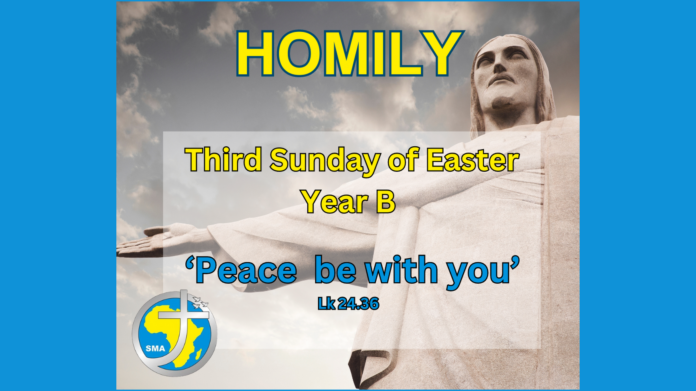Readings: Acts 3:13-15,17-19; 1 John 2:1-5; Luke 24:35-48
Theme: ‘Love in his eyes’’ (Malcolm Guite)
Today’s gospel reading follows immediately after Luke’s dramatic account of our risen Lord’s appearance to two of his disciples on the road to Emmaus, and their recognition of him ‘at the breaking of bread’ (Lk 24:35). The two disciples then hurry back to Jerusalem and relate the story of their extraordinary encounter with Jesus to their companions, huddled together in the Upper Room. While they are still talking, Jesus suddenly appears in their midst with ‘love in his eyes’ (M. Guite). He greets them in these words: ‘Peace (shalom) be with you’ (Lk 24:36).
Spoken by the risen Jesus, this common Jewish greeting has a greater significance that we normally associate with such a greeting. It echoes Jesus’ heart-warming words to his disciples on the eve of his passion: ‘My peace I leave with you; my peace I give to you. I do not give to you as the world gives. Do not let your hearts be troubled, and do not let them be afraid” (Jn 14:27). The peace of Jesus is not the kind of peace we strive to create from our own resources, the peace that flickers for a moment and then is gone. It is more than the absence of conflict. It is an enduring gift of the Spirit that heals, liberates and empowers.
In spite of Jesus’ gracious words, the disciples remain confused and befuddled, thinking that they are seeing a ghost. Aware of their fears and doubts, Jesus, with remarkable gentleness and patience, assures them that he is no ghost but the same person they had known and loved during his earthly sojourn with them. As he did with ‘doubting’ Thomas, he shows them the wounds in his hands and feet and invites them to touch him. And, as they stand around joyful but still ‘dumbfounded’, he asks them to prepare something for him to eat (cf Lk 24:41). Then, as he did with the two disciples on the road to Emmaus, Jesus opens their minds ‘to understand the scriptures’ (Lk 24:45), gradually enabling them to realise that everything that had happened to him, including his passion and horrific death, was the fulfilment of what had been written about the Messiah in the Law, the Prophets and in the Psalms: ‘So you see how it is written that the Christ should suffer and on the third day rise from the dead’ (Lk 24:46). The reading ends with Jesus commissioning his heartened and enlightened disciples to be his witnesses and, in his name, to preach ‘repentance for the forgiveness of sins to all the nations, beginning from Jerusalem’ (Lk 24:47).
Like the story of Jesus’ encounter with the two disciples on the road to Emmaus, today’s gospel reading is more than just an uplifting and beautifully crafted story. It is a profound illustration of what the Christian life is all about: the movement from darkness to light, from despair to hope, from desolation to consolation, from confusion to clarity, and from paralysing fear to courageous witness. Many Christian communities today, can readily identify with the feelings of Jesus first disciples, living ‘behind closed doors, for fear of the Jews’ (Jn 20:19). According to World Watch List 2024, more than 365 million Christians worldwide face persecution and discrimination for their faith. This is a staggering one in seven believers. But I am thinking not merely for those communities where there is violent hostility to Christians, but also of those in so-called tolerant and liberal societies who are cowed into silent withdrawal by mockery and ridicule for upholding Christian values
Today’s gospel reminds us how the Risen Jesus gradually broke through, not merely the physical barrier the disciples’ secured ‘safe house’, but the much greater psychological barriers of their fears, doubts, guilt and confusion. He broke through it all with his presence, his gift of peace, his enlightening words and his empowering Spirit. And he commissioned them to be his witnesses. In the same way our Risen Lord breaks through the barriers that continue to hold us captive today, whether they be barriers created by others or barriers of our own making. And he, likewise, commissions and empowers us to be his witnesses and to share his peace with all peoples. Today’s gospel challenges us to become more and more an Easter people, trusting in the presence of our Risen Lord with us, and continuing to work for the emergence of ‘a new earth and a new heaven’ (Rev 21:1), where the whole world is charged with the grandeur of the Resurrection.
I will end with a moving poetic reflection on today’s gospel from the pen of the Anglican poet Malcolm Guite. It is entitled This Breathless Earth:
We bolted every door but even so
We couldn’t catch our breath for very fear:
Fear of their knocking at the gate below,
Fear that they’d find and kill us even here.
Though Mary’s tale had quickened all our hearts
Each fleeting hope just deepens your despair:
The panic grips again, the gasping starts,
The drowning, and the coming up for air.
Then suddenly, a different atmosphere,
A clarity of light, a strange release,
And, all unlooked for, Christ himself was there
Love in his eyes and on his lips, our peace.
So now we breathe again, sent forth, forgiven,
To bring this breathless earth a breath of heaven.
Michael McCabe SMA
Click on the play button below to listen to an alternative homily from Fr Tom Casey SMA.
|
|

